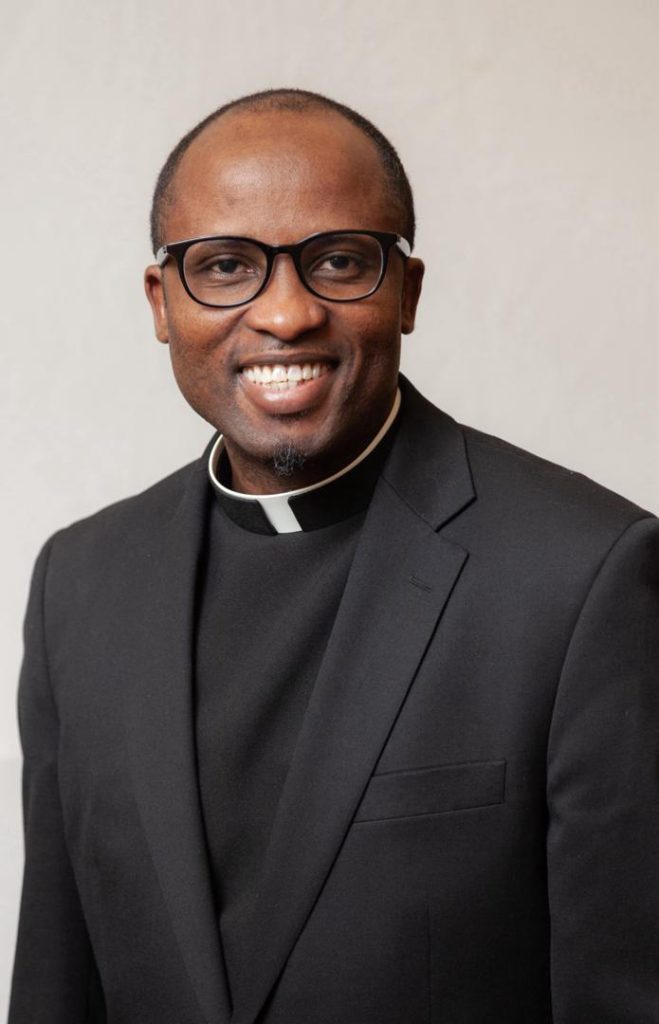The “Good Friday:” What Does It Reveal About Ourselves?
First Readings: Isaiah 52:13—53:12; Responsorial Psalm: Psalms 31:2, 6, 12-13, 15-17, 25; Second Reading: Hebrews 4:14-16; 5:7-9;
Gospel: John 18:1-19:42
The Good Friday Reflection is by
Fr. Cornelius Apili, SJ.,
Jesuit North-West Africa Province, Sierra Leone.

As Catholics, we have experienced so many Good Fridays’ and have never asked ourselves this question: Why is the Adjective “Good” associated with “Friday” of the Holy Week? And what makes a Friday “Good” with all the emotions, frustrations, pains, and religious attachments? The unsaid is that Good Friday is the only day in the life of the Church without the Holy Mass. The entire community gathers together to have The Good Friday Service! Why? This “Three Hours Devotion” is in honor of the time Jesus Christ spent on the Cross by giving up himself in obedience to the will of the Father. How can we replicate this sacrifice in our ordinary experiences here and now?
As Catholics, we need to wake up not only to see things differently but to redefine, solidify, and personalize our faith in the Church’s teachings and ourselves. There is an urgent need for us to live out our faith with vigor and self-awareness. We must recognize that there is always someone out there whose faith probably needs to be rekindled by our presence. Hence, we must know who we are as Easter people. Good Friday always precedes every Easter. In the same way, life has its ups and downs, we must learn to experience calmness as we journey with Jesus Christ through our “Good Friday” and the resurrection at “Easter”. It is an invitation to a deeper awareness and intention.
To hinge our faith on the opinions of others depicts that we are unaware of our being. Hence, we are not conscious of our actions and non-verbal actions as we go about our daily activities. When we know and become aware, there is that probability that we can overcome our struggles as well as help others out of their own experiences of brokenness. Hence, we can emulate the “suffering servant” not named in the first reading (Isaiah 52:13—53:12). This suffering servant is supposedly the prophet who experienced himself as God’s messenger to Israel. This scriptural passage draws our attention to what it means to place ourselves in God’s hands. Like the Israelites, whose experience of suffering weakens their inability to recognize the messianic presence in the person of Jesus Christ, can also be applied to us.
To bring humanity to the desired perfection, Jesus Christ has to share in our human nature—the gift of the incarnation. Jesus Christ was tempted in all human ramifications but never sinned. One could say that Jesus knew what it means to feel frustrated and the pain of losing a loved one and many other human feelings. Hence, Jesus’ final sacrifice was the crown of a life of love, obedience, and generosity, the same way one could say that martyrdom is the crown of a life of Christian fidelity. Through this act of blind Obedience, Jesus Christ bridged the gap between heaven and earth, thereby allowing the prayer in his heart which is to establish God’s kingdom in our hearts. Jesus Christ learned perfect obedience through the experience of the Cross, giving himself up to the Father’s will and for our salvation.
The passion narrative according to John’s gospel— Johannine— account of Jesus’s account of passion shows Jesus’ kingly characteristic by walking majestically to his triumph in death. In this instance, He was declared a king in the three major languages—Latin, Greek, and Hebrew—by the same person who had condemned him to death (John 19:20-22). How can someone walk majestically to his triumph death? This call entails a deep understanding of oneself and purpose in life. Hence, our experience of “The Good Friday” should impel us to live a life worthy of the gospel. If we like, we can say, “Live and let live.” The call of the gospel constantly resounded in our ears. This call is not limited to our memorable experiences, even our awful one has the mark of God in it.
If as Catholics we find something “Good” and “Remarkable” in a day that someone gave up his life for us, then we must also learn to see God in our difficult experiences. The experience of the two disciples who were disappointed about their hopes and dreams after watching their Master killed like a criminal (Luke 24:13-35)—the Emmaus experience. In truth, we all have plans for our lives and those we love. However, when these plans fail, we instantly fall into depression and feel that God does not care about us. The “Good Friday” reveals to us an emptiness that we need to fill with the gospel. Like the two disciples, our journey to Emmaus must take us back to moments that are not pleasant and unremarkable to see how God’s plan is revealed.


Comments are closed.